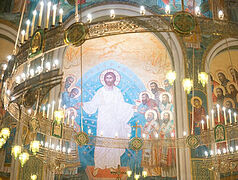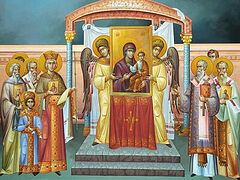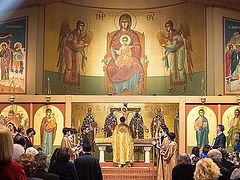Belonging to the true Orthodox Apostolic Church, the majority of us grow up and are brought up in the awareness of our spiritual rightness and strength. Therefore, we are indulgent to other religions and beliefs—that is, we’re tolerant of other faiths. But on the other hand, this religious and moral complacency develops some shortcomings in us. For example, many don’t study or examine Holy Scripture and the works of the Holy Fathers at all, and lacking any foundational knowledge, they become susceptible to errors, to being influenced by sectarians and heretics who entice them with their Scriptural studies and their false interpretations that serve their own purposes.
For the same reason, our educated society disdains and condemns the rite of anathemas against apostates and enemies of God that we serve in cathedrals on the first Sunday of the Great Fast, when the holy Church celebrates Orthodoxy’s triumph over all heresies. These critics of ours, educated secularly but not spiritually, consider this Church ordinance obsolete, superfluous, and inconsistent with the Christian religion, which is founded on love. Amongst the people, the word “anathema” has become offensive and hateful.
It’s also remarkable that the meaning of this spiritual judgment has been explained so many times to modern Christians and educated society by the most prominent theologians and holy hierarchs-preachers, so much has been written and printed about it, but the condemnation and delusion still continues and they don’t learn anything. Let’s try to briefly explain the essence of the matter again.
First of all, we have to clarify why and when this feast was established, and also what the proclamation of anathema means. The feast was established in the eighth century after the Nativity of Christ, after the Orthodox Church’s victory over the heresy of the Iconoclasts, who rejected the holy icons. The Greek Empress Theodora definitively restored the veneration of the holy icons in her empire, and in 842, on the first Sunday of the Great Fast, the Feast of Orthodoxy was celebrated to commemorate the triumph over all heresies condemned at previous Ecumenical Councils, and in general over all impious teachings contrary to the teachings of the Lord Jesus Christ and the Holy Apostles. The proclamation of anathema means excommunication from the Church; that is, from the society of believers, and the loss of the blessing of God, the blessings of the Kingdom of Heaven.
Now let us examine whether the holy Church has the right to do this, whether it should excommunicate blasphemers, whether this is in accordance with the spirit of Christian love, and whether it’s necessary to observe this rite of the anathemas today.
Every action in the Orthodox Church is based only on the directives, commandments, and ordinances of the Lord Jesus Christ Himself and the Apostolic canons and regulations approved at the foundation of the Christian Church. That’s why our Church is called Orthodox, because it has nothing self-willed, but acts correctly in all things and glorifies the Lord infallibly, as the Holy Spirit taught the Holy Apostles. Speaking with the Apostles about those who are disobedient to the Church, Jesus Christ said: Moreover if thy brother shall trespass against thee, go and tell him his fault between thee and him alone: if he shall hear thee, thou hast gained thy brother. But if he will not hear thee, then take with thee one or two more, that in the mouth of two or three witnesses every word may be established. And if he shall neglect to hear them, tell it unto the Church: but if he neglect to hear the Church, let him be unto thee as an heathen man and a publican (Mt. 18:15–17).
Consequently, Jesus Christ established the Church’s judgment over those members of the Christian Church who disobey, and this should consist of the following actions: First, you have to rebuke the guilty party in private, and if that doesn’t help, repeat the accusation in the presence of two or three witnesses. If he still doesn’t correct himself, then tell the Church, the entire assembly of the faithful, but if he doesn’t listen even to the whole Church, then the guilty one must be completely rejected, excommunicated from the Church, or given over to anathema. To confirm the Apostolic and priestly rights in the Christian Church, the Lord then added to His disciples: Verily I say unto you, Whatsoever ye shall bind on earth shall be bound in Heaven: and whatsoever ye shall loose on earth shall be loosed in Heaven (Mt. 18:18). From these words of the Son of God, it’s quite clear that in view of existing need, the pastors of the Church have a direct duty to judge and bind certain people; that is, to excommunicate them from the Church and all its privileges.
If it’s necessary for the salvation of men that they be Christians, then naturally the Church must have its judgment, for the holy Church is obliged to protect the purity of the Christian faith with all strictness, to save the lost from eternal destruction and lead them to repentance. The Lord Jesus Christ also said: And whosoever speaketh a word against the Son of Man, it shall be forgiven him: but whosoever speaketh against the Holy Ghost, it shall not be forgiven him, neither in this world, neither in the world to come (Mt. 12:32). What do heretics and certain sectarians do if not blaspheme the Holy Spirit? This is the horror of their sin, and therefore the Holy Fathers say that the above-mentioned words of the Lord are the same as an anathema.
The Church’s judgment was founded by the Lord and is it not blasphemy to say there’s no love in it? Is it possible that these critics of anathematization have never read the Holy Scriptures and haven’t seen there, for example, this saying of the Psalmist: Cursed are they that turn aside from Thy commandments (Ps. 118:21)? This psalm is read in the Church daily. Do they desire to condemn the Divinely inspired King David? Haven’t they seen these words in the Apostolic letter: But though we, or an angel from Heaven, preach any other gospel unto you than that which we have preached unto you, let him be accursed [anathema] (Gal. 1:8)? Do they intend to accuse the Divinely inspired Apostle of a lack of meekness? If no one can deny that the Prophet and Apostle pronounced strict judgments from the wisdom given them by God, then it must be acknowledged that even now the holy Church pronounces judgments in accordance with the same wisdom (St. Philaret).
Of course, the methods of reproving and bringing sinners to repentance that were indicated by Christ for the Church’s judgment show only love and patience. This is also proven by the prayers that make up the Rite of Orthodoxy. Undoubtedly, the critics of the rite have never read these prayers, but the triumph of the excommunication of the opponents of the Orthodox faith is accompanied by petitions to God to soften their obstinacy, to convert them to knowledge of the truth and number them among the chosen flock.
Anathema is the Church’s final warning to the deluded, but is not the voice of warning, no matter how loud, the voice of love? By exposing the deluded to shame, the Church thereby takes away the charm of special, seductive wisdom and deception, smiting them with the name of God; it takes away the hope of safety, but doesn’t deprive them of the paths to repentance; and the doors of mercy, opened so many times for them in vain, can be opened again (St. Philaret). And it’s not the cruelty and sternness of Church law that should be marveled at, but the malice, enmity, and hellish power of those sinners who don’t obey the judgment of God, don’t submit to the Church of Christ, and continue to be at enmity, despite exhortations, rebukes, judgment, and finally, rejection by the Church. Such men can’t understand the feeling of love. Apostates are proud, like the enemy of mankind himself, who wasn’t saved by the love of God. They place themselves above Christ’s Church, and they can only be rejected and anathematized!
People wonder why we still observe anathematization. But is it really useless to proclaim anathema against the apostates of Arius, Macedonius, and others, when we have among us now even more terrible, daring, and blasphemous preachers, regicides, and enemies of Christ? What can the Church do? Out of love for God and man, out of the firm conviction of its duty, to loudly pronounce judgment, repeated in Heaven, over shameful apostasy, over treason to the fatherland, and kneel and pray for the salvation of the lost.
Beloved ones! Instead of condemning the Church, every member has the duty to examine his conscience. The holy Apostle writes: “Are you looking for proof that Christ is speaking through me? Rather, examine yourselves, whether ye be in the faith” (2 Cor. 13:5). And now the holy Church is forced to address the same question to certain Christians: “Are you in the faith when you don’t believe that the Church is the pillar and ground of the truth?” (1 Tim. 3:15). Are you in the faith when you wish that the Church wouldn’t raise its voice to strike down delusion, when the enemies of truth extend their blasphemous mouths practically to Heaven to utter mockery and temptations (St. Innocent of Kherson)?
Thus, the judgment pronounced by the Church now is a terrible judgment, but a judgment of love. Look at it with eyes of love, heed it with ears of love! Share in the Church’s prayers for the lost; entreat for them a spirit of repentance and chastity. And may the voice of the Church always be heard, and always firm, mighty, and efficacious!
Amen.




